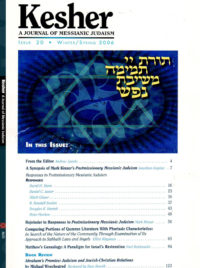From the Editor – Issue 20
By Andrew Sparks
This issue of Kesher offers a forum on the ongoing dialogue on the nature and direction of Messianic Judaism. Dr. Mark Kinzer’s new book Postmissionary Messianic Judaism: Redefining Christian Engagement with the Jewish People serves as a catalyst for this dialogue. Kinzer’s Postmissionary Messianic Judaism seeks to redefine Messianic Judaism in terms of its relationship…
A Synopsis of Mark Kinzer’s Post-Missionary Messianic Judaism
By Jonathan Kaplan
This issue of Kesher is dedicated to fostering discussion about Mark S. Kinzer’s new work Postmissionary Messianic Judaism: Redefining Christian Engagement with the Jewish People. Kinzer, an ordained rabbi of the Union of Messianic Jewish Congregations (UMJC), serves as spiritual leader of Congregation Zera Avraham in Ann Arbor, Michigan, and as president of Messianic Jewish…
A Response by David H. Stern
By David H. Stern
Mark Kinzer has written an original, broad and deep study of ecclesiology, presenting a paradigm shift in how to understand the relationships between the church, the Jewish people, and Messianic Jews. He writes: Despite its title, this is not mainly a book about Messianic Judaism but about the ekklesia—the community of those who believe in…
A Response by Daniel C. Juster
By Daniel Juster
Mark Kinzer has recently authored a very important book on Messianic Judaism. The book is clearly and logically presented and persuasive, however, I do have some disagreements. A HERMENEUTIC OF LOVE The first chapter of Kinzer’s book provides us with a very helpful hermeneutic. When the teaching of Scripture is clear, we are to…
A Response by Mitch Glaser
By Mitch Glaser
As a career missionary, I read the title of Mark Kinzer’s new book, Postmissionary Messianic Judaism, with some consternation. After all, he seems to be indicating that my job is obsolete! However, Kinzer has made it clear in conversation that the title of the book was not intended to be disrespectful to the Jewish missions…
A Response by R. Kendall Soulen
By R. Kendall Soulen
Good books, though rare enough, are more common than important books. Mark Kinzer has written a good and important book. Kinzer writes lucidly and argues his case clearly and cogently. He is fair-minded and judicious in dealing with the evidence he covers, even when treating data that create difficulties for his position, and he is…
A Response by Douglas K. Harink
By Douglas K. Harink
I believe Mark Kinzer’s Postmissionary Messianic Judaism makes a timely, groundbreaking and crucial theological contribution in several respects: 1. It reflects and contributes to the theological maturing of Messianic Judaism; 2. It challenges Christian theology to ask more seriously what it will make of the Jewish people and practice, in the first place as found…
A Response by Peter Hocken
By Peter Hocken
As a Catholic friend and close observer of the Messianic Jewish movement, I want to give a warm welcome to Mark Kinzer’s new book Postmissionary Messianic Judaism. My reasons for this welcome are as follows. First, for seeking to provide a distinctively Messianic Jewish ecclesiology. His ecclesiology is summarised in five basic principles: “1. the…
Rejoinder to Responses to Post-Missionary Messianic Judaism
By Mark S. Kinzer
I must begin by thanking Kesher, and my esteemed reviewers, for awarding Postmissionary Messianic Judaism such serious attention. I can only hope that the book will receive similar treatment within our movement as a whole, as well as within the wider Christian and Jewish worlds. I have learned much over the years from these six…
Comparing Portions of Qumran Literature with Pharasaic Characteristics
By Elliot Klayman
In search of the nature of the community through examination of its approach to Sabbath laws and angels. BACKGROUND No archaeological find has produced a greater abundance of writings (both scholarly popular) than the discovery at the eleven caves at Khirbet Qumran, Israel, just northwest of the Dead Sea. This “Geniza in the Desert” has…
Abraham’s Promise: Judaism and Jewish-Christian Relations by Michael Wyschogrod
By Russ Resnik
by Michael Wyschogrod; edited and Introduction by R. Kendall Soulen GRAND RAPIDS: EERDMANS PRESS ©2004 Reviewed by Russ Resnik Modern Orthodox scholar Michael Wyschogrod considers Messianic Jews to be all wrong about Yeshua, but he is essential reading for anyone interested in Messianic Judaism. Wyschogrod often seems to understand Messianic Jews better than we understand…

